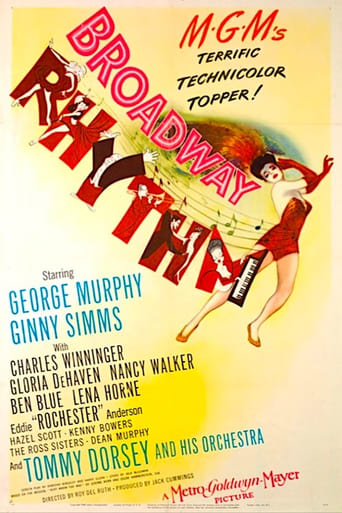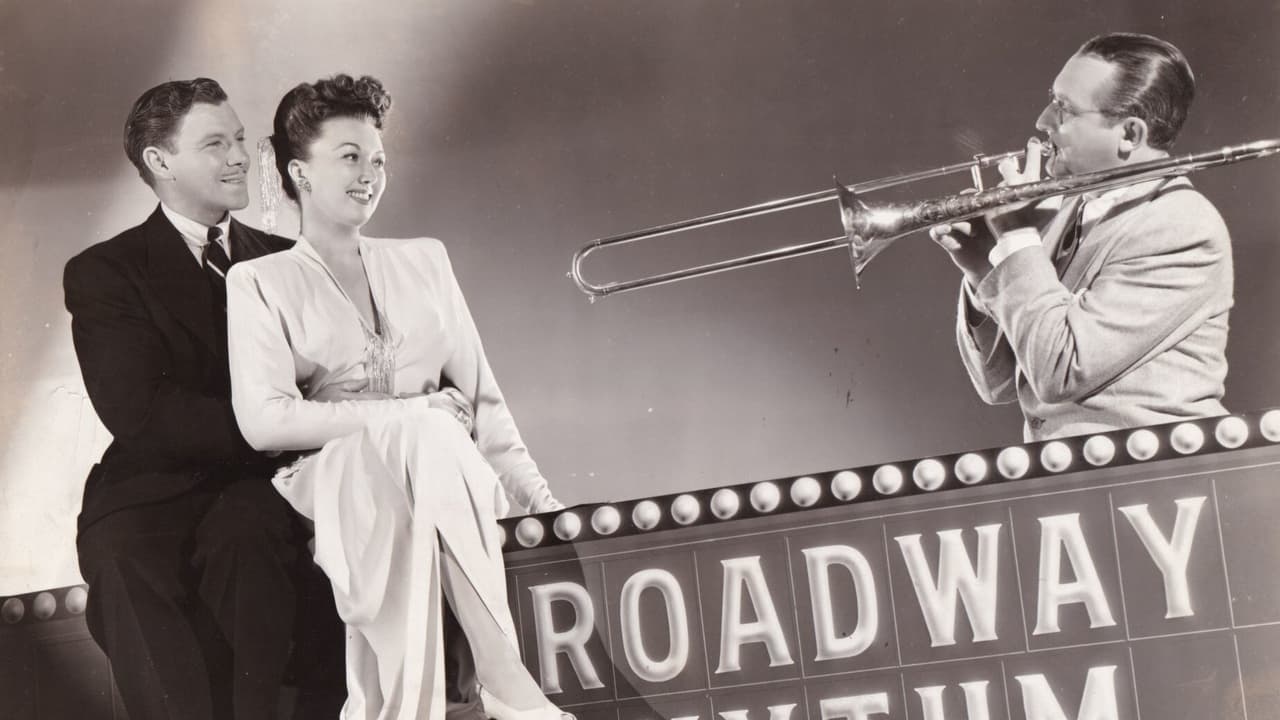SimonJack
What's not to like about this film of the early musical genre? Although it lacks any very big star names for the time, it's a fun and entertaining variety show put on film. I'll give something more on that genre later. There are a lot of acts with a lot of talent – all very good. As most musicals of its genre to that time, it doesn't have much of a plot. And, it apparently underwent considerable changes in the original plans and casting. The hit songs are repeats from 1943 or earlier. But, I decided to chance it for two reasons. First, all the usual musicals of the early genre were of the stage revue type. They usually were very entertaining, and they often had performers that one may not have seen before. Second, the film has Tommy Dorsey and his orchestra. I will always try a movie that has any of the big name swing bands in it. I grew up with that music in the 1940s and 50s, before rock 'n roll; and the swing era had so many super talented musicians and bands that it showcased. Since it made the vocalists so popular, we've not had another time (other than classical or pops concerts) in which the music makers have been in the spotlight. And yet, swing era music lives on more than any other genre as background and theme music in movies. So, the cast in this one is quite good and all the technical aspects of the show are fine. Tommy Dorsey has a decent role with some good lines beside his playing and leading his band. I think he's one of the better of the band leaders at acting too. Lena Horne has two dazzling numbers in "Brazilian Boogie Woogie," and "Somebody Loves Me." Ginny Simms sings three romantic songs: "Amour, Amour," "Irresistible You," and "All the Things You Are." Gloria DeHaven has a couple of nice songs and dances. Walter B. Long is one of those unknowns who only appeared in two films – but here he does some dazzling dancing. Another person I might not have heard play was Hazel Scott, an outstanding classical and jazz pianist, born in Trinidad. She really makes the piano sing and dance in this movie. A number of other people sing and dance their way through this film with lots of fun. Of course, that includes George Murphy in the lead as Broadway producer Johnny Demming, and his pop, Sam, played by old-hand actor and terrific performer Charles Winninger. One other act in this film was very interesting and entertaining – again something one would only see in a stage revue or show like this. The Ross sisters – Aggie, Elmira and Maggie, do a nice song and dance number – I think it's called "Potato Salad" that include some fantastic acrobatics on their part. They all three must have been triple-joined. The popularity of this type of entertainment didn't wane for decades. But it took to new venues. In the 1950s, singing stars left the big bands that 'discovered' them, and began performing on their own. Some would develop their own bands. They toured the country giving concerts. They would usually include other performers and acts – to the give stars a break, if for no other reason. There were crooners like Bing Crosby and Dean Martin, jazz and blues singers like Louis Prima and Lena Horne, pop singers from the swing bands such as Frank Sinatra and Kay Francis, and rock and roll singers such as Elvis Presley and Jerry Lee Lewis. Early television began to sponsor variety shows, and helped discover more talents – or propel them into the spotlight and fame, as it did Elvis Presley. Ed Sullivan was the king of the variety and review type show on TV for many years. The Ed Sullivan Show (aka, The Toast of the Town) ran for 23 years from 1948 to 1971. It was the longest running variety show broadcast in history. That was a new venue for the revue type of shows. I enjoy all types of musicals, and think that the type of entertainment we see in films such as "Broadway Rhythm" just doesn't have a public venue in the 21st century. To see something like this film today, one would have to go to a concert and buy tickets that would cost in the range of $50 to $100 or more. But, here we have it on film, and can watch it in the uncrowded comfort of our homes. I highly recommend "Broadway Rhythm" just for the music and dancing entertainment alone.
Neil Doyle
Whomever took a look at the final script for "Broadway Rhythm" must have realized that the only thing that might put this one over would be an abundance of talented performers, since the plot was a mere trifle.As a result, the film is full of gifted performers unable to bring much life to this routine musical about a producer quarreling with his father over how to produce their next show and walking out on him. Of course, everything is straightened out by the final reel and the show is a smash hit.MGM produced this in velvety Technicolor with all the trimmings but there's no disguising the fact that the witless script is full of flat lines and only occasionally does a song get that MGM treatment.George Murphy and Ginny Simms get top billing with Gloria DeHaven, Charles Winninger, Nancy Walker and Ben Blue in good support. Guest star Lena Horne gives the film its most solid moments with two specialty numbers and Hazel Scott does magic with her finger work at the piano. Eddie "Rochester" Anderson provides some comic relief.But Murphy gets only one dance routine at the finale and Ginny Simms only gets one memorable song ("All The Things You Are") to warble before the show is over. It all has a slap-dash kind of organization, the story flow stopping every few moments to accommodate another frenzied number.The tiresome script is the problem, lacking wit and originality. Six years later, "Summer Stock" with Judy Garland and Gene Kelly (and Gloria DeHaven) did a much better job with similar material and better songs.
tavm
In my next contribution of comments of African-Americans in films in chronological order for Black History Month, we're now in 1944 with Broadway Rhythm. This movie is the perfect example of how the unwritten rule of black actors not being allowed to perform with their white counterparts of the time unless they're domestics comes into play. Eddie 'Rochester' Anderson plays Eddie here and has scenes with Charles Winninger, Gloria DeHaven, and the star, George Murphy. They're all as the family butler. The one exception is the George and Ira Gershwin number, "Sombody Loves Me", performed by Lena Horne with Eddie being the silent partner in the act. Afterwards, Eddie makes a deal with Winninger for them to be in the show. That scene, along with the Hazel Scott piano swing version of "Minute Waltz" are positioned in such a way that Southern theatres could cut those sequences without hurting the story (as evidenced by their absence in the final production number). By the way, Leon Warwick is the doorman in the Scott sequence and Archie Savage is Horne's dance partner in her other number, "Brazilian Boogie-Woogie". Both of Horne's numbers and Scott's were very entertaining. Leading lady Ginny Simms does fine with the only Kern-Hammerstein song, "All the Things You Are", sang intact from the original play source, "Very Warm For May". I also liked Gloria DeHaven in her numbers and Winninger's duet with Tommy Dorsey on "I Like Corny". The Ross Sisters also provide their own acrobatic charm here. Nancy Walker and Ben Blue are pretty hilarious with the "Milkman Keep Those Bottles Quiet" number with Dorsey. What I didn't like was Dean Murphy as a farm hand who does celebrity impersonations that I half didn't recognize and didn't think was funny when I did (like his Mortimer Snerd). He definitely should be cut. After Lena's last number the movie could have been over by then and I wouldn't have cared. Having said all that, I do recommend Broadway Rhythm for anyone who loves musicals even with the threadbare plots like the one presented here.
dwgraham1950
I've always enjoyed this movie and consider it one of the better musicals of the 1940's. There has been quite a bit of interest in the Ross Sisters as they have popped up all over the internet due to their performance in Broadway Rhythm. They were billed as Aggie, Maggie, and Elmira but their real names were Vicki, Dixie, and Betsy. They hailed from Colorado City, Texas and were daughters of dirt farmers during the dust bowl days. They trained on their own and began working theaters and fairs in the Midwest. Pooling their money, they bought a trailer and moved to New Jersey to a trailer park about a mile from the George Washington bridge on Route 6. They earned minor roles in a George Kaufman play, Count Me In, and went on to Broadway Rhythm then Pickadilly Hayride at the Prince of Wales Theater in London. They were summoned before the King and Queen for a command performance on Nov. 4, 1946.


 AD
AD


